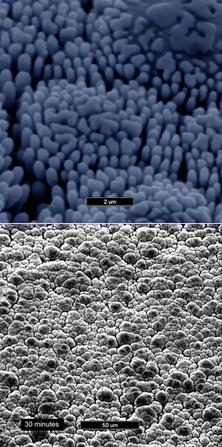Engineering:Alkaline electroless nickel boron coating

Alkaline electroless nickel boron coating (NiB) is an autocatalytic coating process. The coating is deposited from an aqueous solution which contains either an alkylamineborane or sodium borohydride as a reducing agent, a source of nickel ions, a buffer, complexant, and control chemicals.[1] Alkaline nickel boron coatings are classified as Type 1, Nickel thallium boron or Type 2, nickel boron.[2]
Characteristics
As-plated grains of amorphous nickel boron deposit in a columnar structure with the columns being perpendicular to the substrate surface and forming a nodular topography on the surface.[3] Coating will contain 2.5–8% boron by weight.[2]
Generations
Generation 1
Type 1, Nickel boron thallium
The original Bellis formulation, (H.E. Bellis, US patent 3674447), was modified by adding stronger chelating agents to produce generation 1 nickel boron. A method for applying nickel boron to titanium without fatiguing the titanium substrate was also developed.[4]
Generation 2
Type 1, Nickel boron thallium
In 1986, generation 2 nickel boron, (C. Edward McComas, US patent 5019163), was developed which further increased stability and repeat-ability of the process. These changes qualified the process for more stringent quality control programs.
Generation 3
Type 1, Nickel boron thallium
Introduced in 1994 and patented in 1998, (C. Edward McComas, US patent 6183546), Generation 3 was introduced, which could be replenished while in use versus the earlier generations that were operated as batch systems enabling high-volume production within a 3% standard deviation.
Generation 4
Type 2, Nickel boron
In 2000, the patent was issued for Generation 4 nickel boron, (C. Edward McComas, US patent 6066406). Generation 4 was characterized by the implementation of lead tungstate as the stabilizer in place of thallium sulfate. UCT Coatings Inc. holds the exclusive rights to Generation 4 under the brand names UltraCem, Fail Zero, and EXO.[5]
Applications
Nickel boron coatings are columnar in growth, resulting in a distinct nodular topography which serves to reduce surface-to-surface contact of two mating/sliding surfaces reducing drag/friction. The nodular structure dissipates heat at greater efficiency due to greater surface area. The combination is advantageous when used on saw blades as an example by greatly reducing the drag and temperature of a Nickel Boron-coated saw blade, US patent application 20090205470-A1, published 2009-08-20. The nodular structure also reduces drag in both aerodynamic and fluids such as when applied to ship propellers ( US patent application 20090123777-A1, published 2009-05-14), down-hole crude oil pumping equipment, bushings, thrust washers used for a wide variety of automotive and truck transmissions, guide plates for paper handling equipment, and greaseless guns (Edward McComas, US patent 6782650).
References
- ↑ ASTM B607. "Standard Specification for Autocatalytic Nickel Boron Coatings for Engineering Use- 91(2009)". http://www.astm.org/DownloadStandardA.html?ASTM%20HC=&DESIGNATION=B607&AdID=&Split=&Campaign=Individual%20Standards%207.
- ↑ 2.0 2.1 SAE. "AMS 2433B-1994 Plating,nickel-thallium-boron or nickel-boron". http://www.saestandards.net/index.php?main_page=product_info&cPath=2&products_id=44122.
- ↑ Y.W. Riddle; T.O. Bailer (April 2005). "Friction and wear reduction via an Ni-B electroless bath coating for metal alloys". Journal of Materials 57 (4): 40–45. doi:10.1007/s11837-005-0080-7.
- ↑ PWA-259. "Processes and Specifications". http://www.purecoat.com/processes-approvals.php.
- ↑ "UCT Coatings, Inc.". http://www.uctcoatings.com/.

